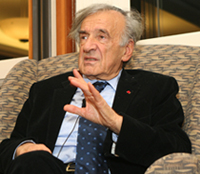Elie Wiesel to speak on Jewish history and religious fanaticism
Talk marks Nobel Prize winner’s 31st annual lecture series

Like many observers of world events, Steven Katz, director of BU’s Elie Wiesel Center for Judaic Studies and a College of Arts and Sciences professor of religion, is convinced that religious fanaticism is one of the most important subjects of our time. So Katz was pleased when he learned that Elie Wiesel (Hon.’74), BU’s Andrew W. Mellon Professor in the Humanities and winner of the 1986 Nobel Peace Prize, had chosen to speak on that topic for his 31st annual lecture series at BU.
The internationally recognized human rights activist and author has given a series of free public lectures at the University every fall since 1975. Three Encounters with Elie Wiesel: The Fascination with Jewish Tales focuses this year on Jewish history, beliefs, and religious fanaticism.
For three consecutive Mondays, October 16, October 23, and October 30, Wiesel will speak on topics titled A Portrait of the Messiah; “And thou shall love thy neighbor”: Against Fanaticism in the Talmud; and A Woman in Hasidism: The Maiden of Ludmir.
“The benefit of having a professor like Wiesel at BU is enormous,” says Katz. “He brings such a unique, worldly perspective and his connections to the intellectual and political aristocracies of the world give him a unique point of view.”
Katz will give a brief introduction to the October 23 lecture regarding fanaticism in the Talmud, Judaism’s holiest book. He calls the topic “one of the most important subjects of our time,” not only for members of the Jewish faith, but for the entire world, which is presently battling Muslim extremists.
“It’s a crucial issue in our own time when fundamentalism and people claiming religious monopoly are killing other people because they disagree,” Katz says. “Even though this is a lecture on a classical subject, it raises the most contemporary and pressing issues of our time.”
Wiesel, who has written more than 40 books of memoir, fiction, and commentary, including Night, one of the first autobiographical accounts of the Nazi death camps, appeals to such a wide audience not because of the horror he endured, says Rabbi Joseph Polak (Hon.’95), director of Hillel House and rabbi to BU’s Jewish community, but because of what he has made of himself since that experience.
“Being sent to a Nazi camp happened to a lot of people; it’s how he dealt with those memories that makes him great,” says Polak, who will introduce the third lecture in the series, on the Maiden of Ludmir, a Jewish holy woman and charismatic leader. “He speaks to the heart without compromising the mind because he is not put off by the overarching and difficult Dostoyevsky-esque theological questions.”
Hillel House will host an open reception following the last lecture, where Wiesel will speak more intimately with guests and answer questions.
“Kids come to the lectures mesmerized by him, awed by him,” says Polak. “They know that they are in the presence of a great man. I think that he is a blessing to Boston University and that he gives it a gravitas and a seriousness that almost nobody else brings.”
All lectures in the series take place in the George Sherman Union’s Metcalf Hall, 775 Commonwealth Ave., and are free and open to the public. Doors open at 6 p.m. for the 7 p.m. events.